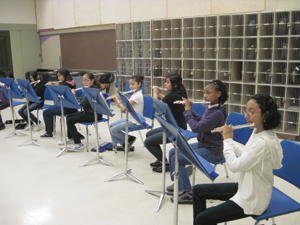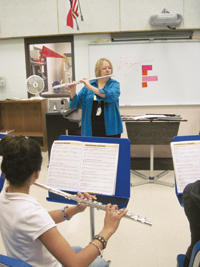During my senior year in high school I had moved out of my home and was working two jobs to support myself. When it came time to apply for college, I needed to major in something where I could make a living. I really wanted to be an orchestral player and had been one of the top All-State clarinet players in my state, but I knew the odds of winning an orchestral job were not good. Instead, I enrolled in the nursing program at a local college. I figured nurses were always in short supply, and I would easily find employment upon graduation.
At the end of my first semester in college, the band director saw me on campus and said, “Weren’t you one of the top All-State clarinetists? Why aren’t you in the band?” I explained I was in the nursing program and was working two jobs to stay in school. A few days later he called and offered me a scholarship to play in the band. The scholarship was enough so that I could quit one of my jobs. I accepted with the condition that I would sit last chair, and there would be no pressure to practice outside the rehearsals. He agreed. The next term the director told me that I had been doing a great job and offered me more scholarship money and private lessons. This meant that I could quit my remaining job and have enough time to study and practice. I eventually changed my major from nursing to music education and after graduation set off as a band director.
 Like most beginning teachers, I had not fully realized the influence a teacher can make in a student’s life. Looking back now at my college experience, I am so grateful my band director took the time to find me on campus and offer opportunities that not only made my life easier at that time, but led to a fulfilling career. He changed my life. This was an aspect of teaching I had not anticipated, yet, music teachers do this every day. I find this is one of the most rewarding parts of the job.
Like most beginning teachers, I had not fully realized the influence a teacher can make in a student’s life. Looking back now at my college experience, I am so grateful my band director took the time to find me on campus and offer opportunities that not only made my life easier at that time, but led to a fulfilling career. He changed my life. This was an aspect of teaching I had not anticipated, yet, music teachers do this every day. I find this is one of the most rewarding parts of the job.
At one school a boy named Andrew was in my band. Andrew lived in a gang-ridden neighborhood and attended an inner city public school. Having little parental support, he frequently chose to stay home rather than attend school. When he was in school, he rarely participated in classroom activities or completed homework assignments.
One semester he was assigned to my elementary band class. I could see he was a troubled kid and did not yell at him as some of the other teachers had. I treated him just like the other students which meant he had to participate in the classroom activities. I kept the pace of each class period moving quickly and explored creative ways to learn. Everything went by so fast that Andrew participated before he had time to think anything over and refuse. After several weeks Andrew decided he was safe with me.
Andrew played the flute. One day as he was lingering after class, I told him my main instrument was the clarinet, but during my college woodwind methods class, I fell in love with the sound of the flute. I told him playing the flute spoke to me in a personal way different from the clarinet and how practicing relaxed me. He was silent and looked at me with blank eyes. I thought I would never reach him.
Day after day, Andrew silently sat in the band class, but still playing his flute with the group. In this middle school, students played on instruments which were purchased by the school district. The students were not allowed to take an instrument home because it never came back again. If it was not stolen, a relative would sell it for drug money. In order to practice their instruments students came in after school. Sometimes the band boosters provided pizza or cookies for the children. One day Andrew appeared after school and said, “Could you help me? I want to get better on the flute. I like the flute.” I was astonished but acted as if it was no big deal. I shrugged my shoulders, got my flute and said, “Let’s play.”
We worked on tone production by playing octaves on the headjoint, then five-note scale patterns and eventually two-octave scales. We played rhythms and counted aloud. We explored the complete range of the flute, correcting and learning new fingerings as we went. Andrew had been one of the weakest flutists in the section but that slowly began to change. He started catching up and very soon was passing the other flutists in playing tests. He worked toward auditioning for an honor band and won first chair. Andrew was hooked, and the hook was the flute.
What happened next was a complete transformation. Andrew began attending school regularly. From the confidence and success he had achieved in the band program, he began participating in other classes. Homework was carefully completed and his grades improved. Instead of dropping out of school, Andrew made plans for high school and college. He practiced each day after school. Sometimes I practiced with him, but most of the time he did it on his own. Many afternoons after his practice, we talked, and I helped him with other class subjects.
 Dynisha’s story is equally inspiring. When Dynisha was in the sixth grade, she came into the band room a few weeks after school started. She looked at the floor as she whispered “I want to be in your band.” She was dressed in a black vinyl coat which was unusual considering the hot, humid climate of South Carolina. I told her the only instrument I had left at this point in the semester was the oboe. If she wanted to play the oboe, the school would furnish the reeds, and the band boosters would pay for private lessons. She agreed and joined the band. Every two weeks I drove her to the local university for private lessons. Dynisha kept her end of the bargain and practiced and practiced. In band she gained confidence and found her voice. She no longer whispered. She talked and laughed, and she shed the vinyl coat. I named her “Oboe Diva of the Universe.” It was a name she came to enjoy, and she continued to work to live up to it.
Dynisha’s story is equally inspiring. When Dynisha was in the sixth grade, she came into the band room a few weeks after school started. She looked at the floor as she whispered “I want to be in your band.” She was dressed in a black vinyl coat which was unusual considering the hot, humid climate of South Carolina. I told her the only instrument I had left at this point in the semester was the oboe. If she wanted to play the oboe, the school would furnish the reeds, and the band boosters would pay for private lessons. She agreed and joined the band. Every two weeks I drove her to the local university for private lessons. Dynisha kept her end of the bargain and practiced and practiced. In band she gained confidence and found her voice. She no longer whispered. She talked and laughed, and she shed the vinyl coat. I named her “Oboe Diva of the Universe.” It was a name she came to enjoy, and she continued to work to live up to it.
At the beginning of the next semester, the special education teacher dropped by my band room. She said “Thanks to you, I am losing Dynisha.” I was stunned and asked what she meant. She said Dynisha had been in the special education program and because of the progress she had recently made, was going to be mainstreamed. Already one semester of band had changed her life. When teaching Dynisha I never looked at what she could not do, but focused on what she could do. I continued to drive Dynisha to a local university for private oboe lessons. By the eighth grade, Dynisha had won a spot in the South Carolina All-State Band. As a reward, I took her out to eat at a nice restaurant in Columbia. I taught her how to order, to use a napkin and which fork to eat with. She was on her way. Dynisha continued with her musical studies and won an academic scholarship to college and a musical scholarship playing the oboe. Graduate school followed and now Dr. Dynisha is a leading chiropractor in her city.
When considering a major in college, do not shy away from music education. While teaching is not the most lucrative field, it is one of the most richly rewarding ways to spend your time and energies. When I look into these students’ eyes and see hope for the future, I know I am in the right career.





